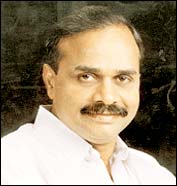Home > Business > Interviews
The Rediff Interview/
'We will ensure Andhra attracts more FDI'
BS Political Bureau in New Delhi |
May 06, 2004
 Y S Rajashekhara Reddy is today easily the most sought after person in Andhra Pradesh.
Y S Rajashekhara Reddy is today easily the most sought after person in Andhra Pradesh.
From a seemingly hopeless position, YSR, as he is popularly called, has managed to bring the Congress to the brink of a seemingly impossible victory at the hustings. Having just returned from a vacation in Ooty in Tamil Nadu, YSR is a composed and confident man.
In an interview, a confident, yet not arrogant, YSR predicts that the Congress will win 180 seats, and its allies another 40 seats in the 294-seat state Assembly.
Under N Chandrababu Naidu's leadership, Andhra Pradesh got global recognition, why then has the Congress managed to do well?
This impression of Naidu's nine-year administration is not correct. What you have heard or read is only hype, at which Naidu is very good.
For example, the hype about Andhra Pradesh becoming the infotech hub of the country. Neighbouring Karnataka accounted for about Rs 15,000 crore (Rs 150 billion) worth of software exports in the last financial year while software exports from Andhra Pradesh for the same period were pegged at Rs 3,000 crore (Rs 30 billion).
Earlier, Andhra was ranked third in the country in software exports. Now, it had slipped to the fifth place after Tamil Nadu, Maharashtra and Noida in Uttar Pradesh.
Also, of the 1 million people who lost their jobs in the entire country during the last two years, 71 per cent of them hailed from Andhra Pradesh.
This is because of the large-scale closure of industries in the state. On human development parameters, the state has slipped a notch to the 10th place, according to the Planning Commission. Per capita incomes are lower than the national average.
The gross state domestic product (GSDP) is only 5 per cent, while the gross domestic product of the country grew at 6 per cent. Also, Andhra Pradesh is ranked on top in the country in terms of women and child trafficking and incidents of atrocities against women.
The state ranked second in the incidence of sexually-transmitted diseases and AIDS. Three out of every four farmers who committed suicide in the country are from Andhra Pradesh. Naidu had not even tried to find out the causes behind such large-scale (about 3,000) suicides committed by farmers.
But his government spent a lot of money on irrigation and on the rural sector in general?
What the Naidu government spent in the last nine years on irrigation is only half of what the Karnataka government spent during the same period on that sector. But in terms of physical parameters, Andhra Pradesh is almost double the size of Karnataka.
The government of India had given Rs 5,000 crore (Rs 50 billion) worth of rice free to the state under the food-for-work programme during the past four years. But 60-70 per cent of this was misappropriated by ruling party leaders themselves.
Naidu himself accepted that about 30 per cent of the rice given under the food-for-work scheme has been misappropriated.
If the Congress comes to power in the state, will you roll back the initiatives that have been taken in the infotech sector or the other reform measures that were undertaken by the present government?
We are not against information technology, and not against anything that is good for the people and the state. We are not against privatisation, liberalisation or globalisation either.
As long as these processes help the people and the economy of the state, we are okay with it. But, we are certainly against selling profit-making public enterprises for a song in the name of privatisation like Naidu. We will not allow the policy of pushing the public sector into a debt trap for the purpose of selling it to private people as Naidu did.
What will be your attitude towards foreign investments, especially those in the infotech sector?
As far as foreign investments and corporate activities of global companies are concerned, we will better the performance of Naidu's government by removing red tape and other bottlenecks.
Haven't you already come out with a different set of priorities for the future government, according to which infotech takes a backseat?
Yes, agriculture, creation of irrigation infrastructure, growth of basic industry, reducing the cost of power generation and focus on employment generation will be our topmost priorities.
The priorities of the Naidu government were totally lopsided, which was why the state has failed to match even the national average on the growth front.
If the government focuses on strengthening the primary and secondary sectors, that not only will help keep the economy healthy and growing but also helps the growth of the tertiary or services sector.
But focusing only on services sector at the cost of other two sectors will result in lopsided development and that was exactly what we have been witnessing in the state under the Naidu regime.
What is your stand on statehood to the Telangana region?
The demand for separate statehood came because of the utter negligence of this region by the Naidu government, especially on the irrigation front.
As far as the demand is concerned we are committed to the formation of a second state reorganisation commission which will come out with appropriate recommendations.